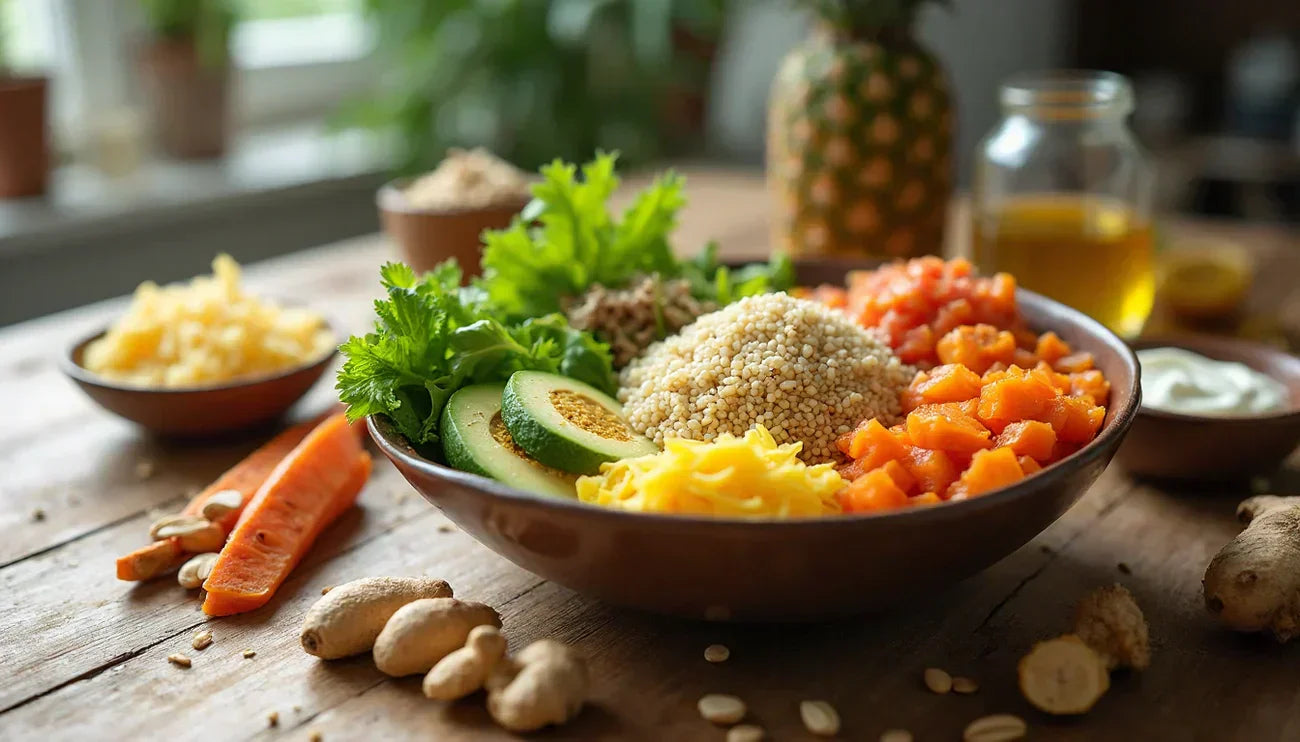Did you know that nearly 80% of your immune system lives in your gut? That's right — your digestive tract houses the majority of your body's immune defenses! This stunning fact explains why people with gut issues often get sick more frequently. It also reveals why healing your gut could be the missing piece in strengthening your immunity. Understanding the gut-immune connection is crucial for maintaining overall health.
What is the gut microbiome?
The gut microbiome is a vast community of bacteria and other microbes living in your digestive tract that play a key role in digestion, immunity, and overall health. When balanced, it helps your body thrive, but when disrupted, it can contribute to everything from bloating and digestive discomfort.
It actually weakens your body's ability to fight off infections and chronic diseases. This is why maintaining a healthy gut microbiome is so important for your overall well-being.
Recent microbiome research has revealed just how deep this gut-immune connection goes. The good news is that you have the power to support both systems at the same time. Simple changes to your diet, lifestyle habits, and targeted supplements can make a huge difference in how you feel and improve your gut microbiome.
Whether you're dealing with frequent colds, digestive problems, or just want to feel your best, understanding this vital gut immune connection is your first step. Let's explore what the latest science tells us about optimizing your gut health for stronger immunity.
Your Gut: The Hidden Immune Powerhouse
Think of your gut as your body's immune headquarters. While most people see it as just a place where food gets digested, your digestive system actually houses a massive immune network. This network protects you from harmful invaders while keeping peace with the trillions of beneficial bacteria that call your gut microbiome home.
What Percentage of Your Immune System Lives in Your Gut?
The numbers might surprise you. About 70-80% of your entire immune system is located in your gut. This makes your digestive tract the largest immune organ in your body, bigger than your spleen or lymph nodes! Understanding what percent of the immune system is in the gut highlights the importance of maintaining a healthy gut microbiome.
Your intestines contain specialized tissue called gut-associated lymphoid tissue, or GALT for short. This tissue is packed with immune cells that are constantly on guard, ready to respond to any potential threats. These cells don't work alone either. They communicate with immune cells throughout your entire body, forming a sophisticated defense network.
The beneficial bacteria in your gut microbiome do some pretty amazing things. They help train your T-cells to recognize the difference between harmful invaders and your own healthy cells. These good bacteria also produce neurotransmitters like serotonin that affect your mood regulation and stress levels. Since stress directly impacts both gut health and immunity, you can see how everything connects through the gut-brain axis!
How Your Gut Bacteria Train Your Immune System
Your gut microbiome is home to trillions of bacteria, viruses, and fungi. From the moment you're born, these tiny organisms start teaching your immune system what's dangerous and what's safe. It's like having microscopic teachers living inside you!
This relationship works both ways. Your gut microbiome influences how your immune cells develop and function. At the same time, your immune system helps keep the bacterial community balanced and healthy. This education process starts when you're a baby and continues throughout your whole life.
Here's a fascinating example: beneficial bacteria produce compounds called short-chain fatty acids. These compounds help regulate inflammation and support special T-cells that prevent your immune system from attacking your own body. Without these bacterial teachers, your immune system might go haywire, either overreacting to harmless things or failing to respond when you really need protection.
The Gut-Immunity Connection Explained
Your gut barrier is a thin layer of cells that lines your intestines. This barrier serves as the crucial meeting point between your microbiome and your immune system. When this barrier gets damaged — what we call leaky gut — it can trigger inflammation throughout your body and throw your immune system off balance.
Poor gut health shows up as digestive problems like bloating, gas, and irregular bowel movements. It may also include signs of microbial imbalance like recurring yeast infections or skin flare-ups, indicators that the fungal side of your microbiome needs attention. The research is clear: taking care of your gut health directly strengthens your immune function. This explains why fixing digestive problems often leads to fewer illnesses overall. Your gut and immune system aren't separate — they're partners working together to keep you healthy and strong.
How Diet Shapes Your Gut and Immune Health
What you eat directly shapes the trillions of microorganisms living in your digestive tract. This internal ecosystem plays a pivotal role in training your immune system to respond appropriately to threats. A gut health diet is crucial for maintaining a healthy gut microbiome and supporting your immune system.
The Impact of Fiber-Rich and Plant-Based Foods
Fiber acts as the primary fuel for beneficial gut bacteria. When these microbes ferment fiber, they produce short-chain fatty acids (SCFAs) that strengthen your intestinal barrier and reduce inflammation. Most people consume only half the recommended 20-38 grams of fiber daily. This is a problem because your good bacteria literally starve without adequate fiber!
Plant-based diets consistently increase gut microbiome diversity, a key indicator of gut health. These dietary patterns show remarkable benefits, including lower inflammation markers and reduced risk of inflammatory bowel disease. Research reveals that consuming at least seven different plant types enhances microbial diversity significantly.
The more variety in your plant foods, the better. Think colorful vegetables, fruits, whole grains, legumes, nuts, and seeds. Each type feeds different beneficial bacteria in your gut. Fiber-rich foods and those high in polyphenols are particularly beneficial for your gut microbiome.
Processed Foods and Inflammation
Ultra-processed foods (UPFs) contribute anywhere from 10% (Italy) to 59.7% (USA) of total energy intake across 20 countries. These foods are bad news for your gut. They disrupt gut bacteria balance and increase intestinal permeability—essentially creating leaky gut.
Studies show that high UPF consumption increases the risk of developing Crohn's disease by 71%. UPFs typically lack fiber while containing excessive sugar, unhealthy fats, and numerous additives that promote inflammation throughout your body.
If you're serious about gut health, processed foods have got to go. Focus on whole, real foods instead to support a healthy gut microbiome.
Healthy Fats and Their Immune Benefits
Not all fats affect your gut equally. Omega-3 fatty acids from olive oil, avocados, and wild-caught fish reduce inflammation and support immune function. These healthy fats should comprise 20-40% of your daily caloric intake.
Saturated fats can damage intestinal barrier integrity by reducing tight junction proteins that keep your gut lining intact. This doesn't mean you need to avoid all saturated fats, but moderation is key.
Protein Sources That Support Gut Health
Protein quality and source significantly impact your microbiome. Plant proteins generally support beneficial bacteria growth, particularly those in beans and legumes.
Animal proteins provide complete amino acids, and their digestibility exceeds 90% compared to 70-90% for plant proteins. However, excessive animal protein intake, especially processed meat, may increase inflammation and IBD risk due to sulfated amino acid fermentation.
For optimal gut immunity, focus on diverse protein sources. Pairing meals with a digestive bitters formula like Digestive Juice can further support protein breakdown, especially if you struggle with post-meal bloating or sluggish digestion. It primes your system to handle both plant and animal proteins more efficiently.

Digestive Juice
A fast-acting blend of digestive bitters used before or after meals to support digestion, occasional gas and bloating.*
STAR HERB: Gentian
Lifestyle Habits That Support Gut-Immune Balance
Your daily habits matter just as much as what you eat when it comes to gut and immune health. Small changes to how you live can make a big difference in how you feel. Let's look at the key lifestyle factors that support both systems and help improve your gut microbiome.
Hydration and Digestive Health
Water is essential for proper digestion. It acts like a lubricant throughout your digestive tract, softening stools and preventing constipation. When you're dehydrated, your body saves water for more critical functions, leaving your digestive system high and dry.
Here's something fascinating: drinking enough water actually helps maintain the balance of good bacteria in your gut while supporting your immune system. Studies show that when people don't drink enough water, harmful bacteria can overgrow in the gut, and immune cells in the colon decrease. This makes it harder for your body to fight off bad bacteria.
The solution? Aim for at least 8 glasses of water daily. Your gut will thank you!
Exercise and Gut Motility
Regular movement keeps your digestive system moving too. Physical activity stimulates the muscles in your intestines, helping food move through your system more efficiently. Research shows that adding aerobic exercise to your routine can help resolve constipation. People who sit all day have much slower intestinal transit times than those who stay active.
Exercise also increases the diversity of good bacteria in your gut microbiome. Even light activity helps reduce the time harmful bacteria spend in contact with your intestinal lining, which protects against colon cancer and inflammatory bowel disease. Physical activity also helps maintain the integrity of your intestinal lining, especially if you eat a high-fat diet.
You don't need to run marathons. Even a 20-minute walk after meals can help improve your gut health!
Stress and Its Effect on Gut Bacteria
Chronic stress wreaks havoc on your gut microbiome. When you're stressed, your nervous system sends signals to your gut that can cause harmful bacteria to multiply and increase gut permeability. This stress response is mediated through the gut-brain axis, highlighting the importance of the mind gut immunity connection.
Stress hormones directly affect bacterial levels in your gut. Cortisol reduces beneficial bacteria, while stress hormones like adrenaline can cause certain bad bacteria to grow 10,000 times faster within hours. Studies on college students during exam periods showed significant decreases in health-promoting bacteria.
Finding ways to manage stress — whether through meditation, yoga, or simply taking time to relax — can have a direct positive impact on your gut health and overall well-being.
Sleep and Immune Regulation
Getting quality sleep is crucial for immune function. When you don't sleep enough, you're more likely to catch colds and flu.
During sleep, your body regulates inflammation and strengthens immune memory. Sleep helps maintain the delicate balance your immune system needs to function properly. On the flip side, sleep deprivation leads to chronic inflammation, which is linked to numerous health problems including autoimmune diseases and neurological disorders.
Aim for 7-9 hours of quality sleep each night. Your gut and immune system will both benefit from this simple but powerful habit.
Probiotics and Other Ways to Improve Gut Immunity
Probiotics are one of my favorite tools for strengthening the gut-immune connection — especially when you're dealing with issues like bloating, irregular digestion, or frequent colds that seem to come out of nowhere. That’s why I created Not Your Average Probiotic — a clinically formulated blend designed to target exactly these pain points. This formula doesn’t just replenish beneficial bacteria; it supports immune balance, gut barrier integrity, and mood regulation through the gut-brain axis. If you've ever felt like your body’s “off switch” is broken or your immune system isn’t firing on all cylinders, this daily probiotic can be a game changer.

Not Your Average Probiotic
Not Your Average Probiotic is a unique combination of probiotics, prebiotic fiber and ...
How Probiotics Support the Immune System
Probiotics get to work immediately in your digestive tract. They interact directly with your immune cells to help keep everything running smoothly. These helpful bacteria stimulate your B cells to produce IgAs—antibodies that serve as your first line of defense against harmful invaders. They also boost mucus production, creating a protective barrier that keeps bad bacteria from reaching your intestinal walls.
Here's what really impressed me about the research: certain probiotic strains can reduce coughing by 41% and fever by 53%. That's powerful! They also help maintain your gut barrier integrity. This prevents leaky gut that would otherwise allow toxins to slip into your bloodstream and cause inflammation throughout your body.
Best Probiotic Foods to Include
I always tell my patients to start with food before turning to supplements. These natural probiotic sources are excellent additions to your daily routine:
-
Yogurt (with "live and active cultures"): Look for varieties containing Lactobacillus and Bifidobacterium strains with CFU counts from 90-500 billion per serving
-
Fermented vegetables: Unpasteurized sauerkraut and kimchi provide diverse probiotic strains
-
Kefir: This offers more diverse probiotic strains than regular yogurt
-
Tempeh and miso: Fermented soy products that support digestive health
-
Kombucha: Fermented tea packed with beneficial bacteria
Start slowly when adding fermented foods to your diet. Your gut needs time to adjust to these new beneficial bacteria.
Prebiotics vs. Probiotics: What's the Difference?
Think of prebiotics and probiotics as a team. Probiotics are the living beneficial bacteria that improve your digestive system. Prebiotics are the food these bacteria need to survive and thrive. I like to explain prebiotics as fertilizer for your internal garden of good bacteria.
You can find prebiotics in high-fiber vegetables, fruits, and whole grains. When you combine prebiotics and probiotics together (called "synbiotics"), you get a powerful approach to gut health. Foods like cheese, kefir, and sauerkraut naturally contain both components.
Signs Your Gut Needs Support
Your body gives you clear signals when your gut microbiome is out of balance. Watch for these warning signs:
-
Persistent bloating and excessive gas
-
Irregular bowel movements (constipation or diarrhea)
-
Abdominal pain or discomfort
-
Frequent heartburn
These symptoms often point to dysbiosis—an imbalance in gut bacteria that weakens your immune function. If you're experiencing these issues regularly, gradually increasing both prebiotic and probiotic foods can help restore balance to your system. You might also consider taking a gut microbiome test to assess your gut health more accurately.
Take Back Your Health Through Your Gut
The connection between your gut and immune system is more powerful than most people realize. Since 80% of your immune function lives in your digestive tract, taking care of your gut health directly impacts how well your body can defend itself against illness and chronic diseases.
Your microbiome works like a personal trainer for your immune system. These beneficial bacteria teach your immune cells what to attack and what to leave alone. They also create a protective barrier that keeps harmful invaders from entering your bloodstream.
What you eat matters more than you might think. A gut health diet rich in fiber and healthy fats feeds the good bacteria in your gut microbiome. On the flip side, processed foods damage your intestinal lining and trigger inflammation throughout your body. It's really that simple!
Don't forget about the lifestyle factors we covered. Drinking enough water keeps your digestive system running smoothly. Regular exercise helps move things along in your gut. Managing stress prevents harmful bacteria from taking over. Getting quality sleep gives your immune system time to recharge and repair.
If your goal is to start small and feel a real difference, try adding a trusted probiotic to your routine. One of my favorites, Not Your Average Probiotic, is specifically designed to help reduce inflammation, improve digestion, and give your immune system the foundational support it needs, all with strains backed by research, not hype.

Not Your Average Probiotic
Not Your Average Probiotic is a unique combination of probiotics, prebiotic fiber and ...
Probiotics and fermented foods can give you extra support when your gut needs help. Whether you choose yogurt, sauerkraut, or a high-quality supplement, these beneficial bacteria work alongside your body's natural defenses.
You don't have to overhaul your entire life overnight. Start with one simple step, maybe adding more fiber-rich foods to your meals or taking a daily walk. Then build from there.
Your gut and immune system are partners in keeping you healthy. When you support one, you're supporting the other. This means you have the power to strengthen your immunity by improving your gut microbiome. That's pretty amazing when you think about it!
Remember, your health is a journey, not a destination. Be patient with yourself as you make these changes. Your body will respond, and you'll start feeling better. You've got this!
















